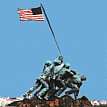 |
1939-1945 |
 |
 |
1939-1945 |
 |
|
"We are determined that before the sun sets on this terrible struggle our flag will be recognized throughout the world as a symbol of freedom on the one hand, of overwhelming power on the other."  |
LECTURE OUTLINE |
currently unavailable. |
|
OVAL OFFICE |
|
|
WHAT'S MY LINE? |
|
|
|
PRIMARY SOURCES / DOCUMENTS |
EXTENDED RESPONSE |
| 1. Discuss the shift in American public opinion away from the concept of isolationism toward the theory of internationalism from 1920 to 1941, in light of the various factors that influenced the change. 2. Explain the failure of the Neutrality Acts to keep the United States out of World War II. 3. Trace the deterioration of relations between Japan and the United States that resulted in the attack on Pearl Harbor. 4. "The United States decision to drop an atomic bomb on Hiroshima was a diplomatic measure calculated to intimidate the Soviet Union in the post-World War II era rather than a strictly military measure designed to force Japan's unconditional surrender." Assess the validity of this statement. 5. Apart from the actual military engagement of World War II, positives and negatives alike came of the war. Discuss these developments, citing specific examples. 6. "Brutality begets brutality." Apply this adage to a particular event in World War II. |
CHEAT SHEET |
|
REWIND & FAST FORWARD |